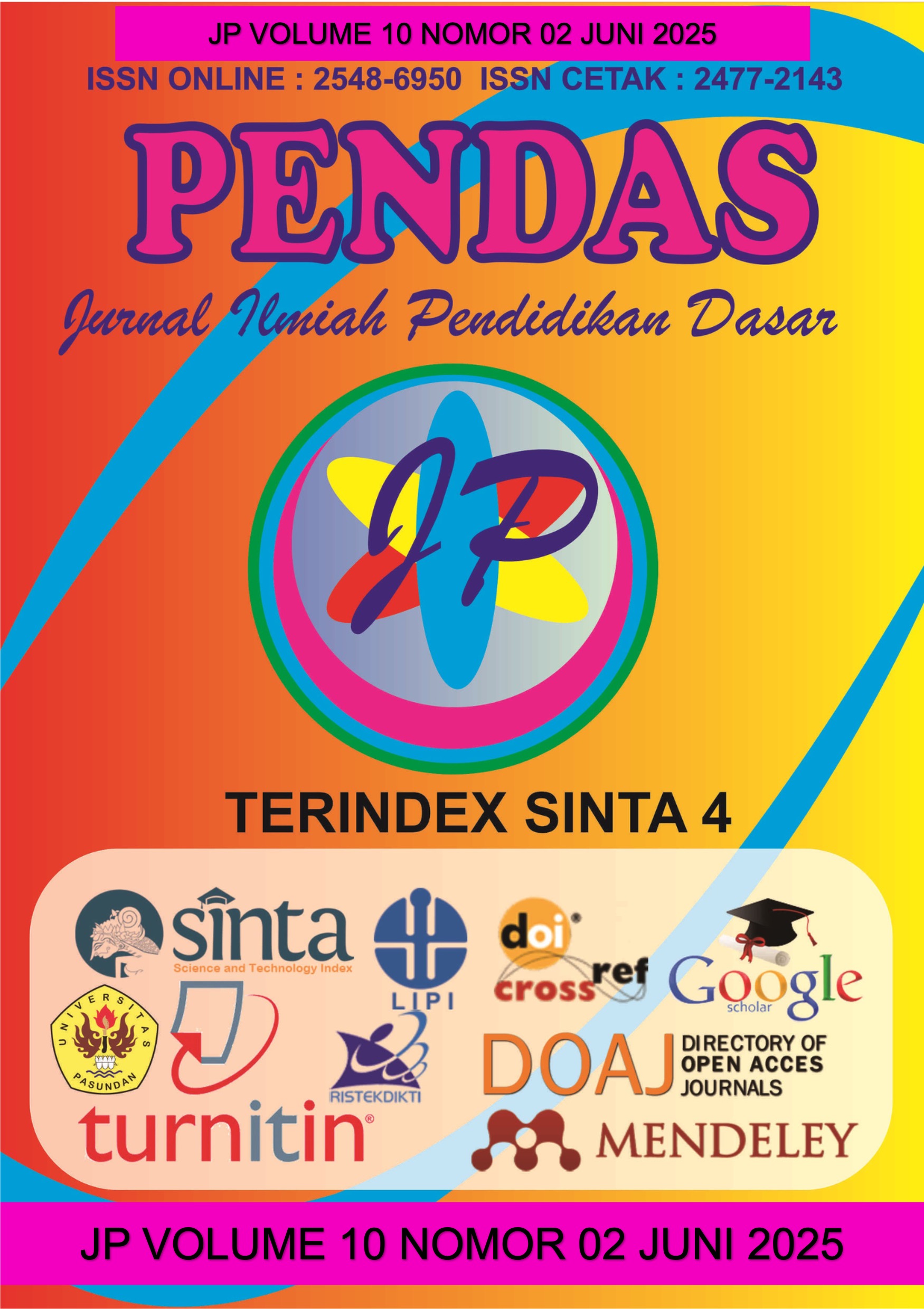PENGEMBANGAN ANSAMBEL MUSIK BERBASIS BUDAYA JAMBI UNTUK SEKOLAH DASAR
DOI:
https://doi.org/10.23969/jp.v10i02.26971Keywords:
Musik ensamble, Jambi Culture, Elementary SchoolAbstract
The aim of this research is to produce an arrangement by describing the steps for developing the product, knowing the level of validity, level of practicality, and presenting musical ensemble games based on Jambi regional culture for elementary schools. This research was carried out at SD Negeri 64/I Muara Bulian. The development research used the 4D (four-D) model, the test subjects in this research were 19 fifth grade students. The results of the research are, firstly, the process of developing musical arts learning based on Jambi regional culture through four stages, namely define, design, development and disseminate. The development product made a prototype of musical notation sheet music using the Sibelius Ultimate application and extracted it into the FL Studio application to create MP3 audio. The level of validity of the learning product is as follows, the feasibility of the material aspect with an average of 5 is included in the very valid category, the learning aspect with an average of 4.6 is included in the very valid category. Meanwhile, the level of practicality is as follows, the results of teacher responses with an average of 4.7 are included in the very practical category, and the results of student responses received an average of 4.58, including the very practical category. It is very important to develop Jambi regional culture-based music ensemble music learning in elementary schools because of its uniqueness, meaningfulness and usefulness for students' development needs which lies in providing aesthetic experiences in the form of expression and creative activities, and by using the arrangement method it can train abilities, talents, development of creativity, as well as increasing students' interest and appreciation for cultural heritage. From the results of this research, it is concluded that the development of music ensemble games based on Jambi regional culture for elementary schools is suitable for use in the music arts learning process in elementary schools.
Downloads
References
Adiarto.(1996). Kerajinan Tangan dan Kesenian. Semarang : Adiswara.
Arts, I. (2024). Analisis Isi Materi Seni Musik Dalam Buku Teks Seni Budaya. Jurnal Pendidikan dan Kebudayaan, 6(2).
Badan Standar Nasional Pendidikan, (2006), Standar isi untuk satuan pendidikan dasar dan menengah, Jakarta: BSNP.
Banoe, Pono. (2003). Kamus Musik. Jogjakarta: Kanius.
Gunara, S. (2008). Manfaat Pendidikan Seni bagi Anak. Dalam Suryatna, dkk.(Penyunting). Ritme. Vol 6 No 1 April 2008
Juliandi Azuar, Irfan dan Saprinal Manurung. (2014). Metodologi Penelitian Bisnis Konsep dan Aplikasi. Medan: Unsu Press
Kania, K., Pamungkas, B., & Hasyimkan, H. (2022). Ranah Kognitif pada Pembelajaran Musik Ansambel di SMA Bukit Asam. JOURNAL OF MUSIC EDUCATION AND PERFORMING ARTS, 2(2), 23-28.
Kiska, N. D. (2022). Pengembangan Materi Ajar Elektronik Berbasis Permainan Tradisional Pyuh Menggunakan Aplikasi 3D Pageflip Professional untuk Kelas IV Tema 4 (Doctoral dissertation, Universitas Jambi).
Maharani, D. (2024). Pengembangan E-Modul Ansambel Musik Berbasis Project Based Learning di Kelas IV Sekolah Dasar. Jurnal PGSD: Jurnal Ilmiah Pendidikan Guru Sekolah Dasar, 17(1), 29-38.
Rahmiati, D., Suharini, E., & Widiyatmoko, A. (2025). Pengaruh Pembelajaran Kearifan Lokal di Jawa Barat dalam Melestarikan Budaya Tradisional bagi Siswa SD. FONDATIA, 9(2), 318-339.
Sugiyono. (2016). Metode Penelitian Kuantitatif, Kualitatif dan R&D. Bandung: PT Alfabet.
Syafiq, Muhammad. (2003). Ensiklopedia Musik Klasik. Yogyakarta: Adicita Karya Nusa.
Thiagarajan. (1974). Instructional development for training teachers of exceptional children.
Thiangarajan, S., Semmel, D. S., & Semmel, M. I. (1974). Instructional Development for Training Teacher of Exceptional Children: A Sourcebook. University of Minnesota. ISBN 978-086-586-045-2
Zulkhi, M. D., Kiska, N. D., Lestari, R. E., Ul’hak, D., & Pratiwi, N. Q. E. (2024, February). COMPARATIVE ANALYSIS OF THE USE OF ELECTRONIC MODULES IN IPAS LEARNING TO IMPROVE COMMUNICATION SKILLS IN STUDENTS. In The Third International Conference on Government Education Management and Tourism (Vol. 3, pp. 033-033).
Downloads
Published
Issue
Section
License
Copyright (c) 2025 Pendas : Jurnal Ilmiah Pendidikan Dasar

This work is licensed under a Creative Commons Attribution 4.0 International License.














































